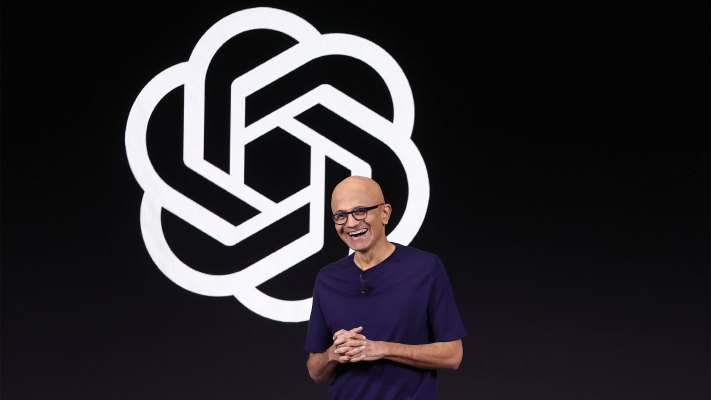Microsoft may end up as the real winner of the OpenAI chaos that reigned over the weekend, and its rallying stock price is indicative of that. Upon the shocking news that OpenAI’s board had unexpectedly fired CEO Sam Altman on Friday, reportedly to due internal strife over OpenAI’s direction, Microsoft stock dropped more than 2% in after-hours trading, potentially wiping out tens of millions in market value. But after Microsoft CEO Satya Nadella announced early Monday morning the company has now hired Altman and OpenAI co-founder Greg Brockman, who also left in protest of Altman’s firing, Microsoft stock is once again climbing.
Wall Street investors, like many in the tech industry, seem to be placing their bets on OpenAI’s co-founders and team, rather than solely on the future of Microsoft’s relationship with the AI startup in which it’s invested over $13 billion as a means of competing with other tech giants, like Google and Meta, on AI offerings.
As news of Altman’s departure broke over the weekend, Microsoft’s stock price dipped — a clear example of how closely the fates of the two companies had become intertwined. By the end of the day, Microsoft was down 1.68% to $369.85. The decline continued over the weekend, even as word that OpenAI was trying to reinstate Altman. But after Nadella announced Microsoft would hire Altman and Brockman, “setting a pace for new innovation,” Microsoft’s stock once again began to rise on Monday morning, recovering from most of its earlier decline.
In early morning trading, Microsoft’s stock was up by over 2%, gaining back much of its losses from the OpenAI saga. It also hit an all-time high of $377.10 at one point, Forbes noted.
Analysts believe that Microsoft is now on the right track, as it not only has pulled in the leadership of OpenAI (and likely more of the team over time as they defect to join the former OpenAI co-founders at their new home), but it also has maintained its relationship with OpenAI for use of its technology in the near-term. Already, Brockman has announced OpenAI defectors including Jakub Pachocki, and Szymon Sidor and Aleksander Madry will be joining Microsoft to help lead the new AI team.
Rosenblatt’s Barton Crockett wrote to clients that the hirings “clearly offer some transitional stability” for Microsoft, Forbes noted, while Wedbush’s Dan Ives said this move puts Microsoft in “even a stronger position” for AI.
According to another research note by Macquarie analyst Fred Havermeyer, as reported by the Financial Times, Microsoft may have “pulled off a coup” of its own:
We think (Microsoft CEO) Satya Nadella may have just pulled off a coup of his own. If many OpenAI employees choose to migrate to Microsoft to join Mr. Altman and Mr. Brockman, then not only would Microsoft hold a license to OpenAI’s IP up to AGI, but Microsoft would also be effectively acquiring OpenAI’s core differentiation — its ambitious and experienced technical talent.
We think this team is well positioned to hit the ground running with experienced leaders who would likely be equipped with familiar Microsoft Azure infrastructure (OpenAI’s exclusive cloud provider) and Microsoft’s robust balance sheet. We believe Microsoft has both preserved its AI product roadmap and assembled formidable competition for generative AI startups and Google DeepMind. We can imagine a future where Mr. Altman’s team could specialize in not just AI model development but also vertically optimizing AI models from silicon to software and building new, category-defining apps.
Microsoft has been trading between $371 and $377.10 today, up from its previous close of $369.85. If it holds onto its gains, Insider reports its market capitalization will grow by $50 billion to reach $2.8 billion by the end of the day.
